| Listing 1 - 10 of 24 | << page >> |
Sort by
|
Book
ISBN: 1283068079 9786613068071 1849400172 0429482353 1855750007 0367328194 9781849400176 9781781810996 1781810990 9781855750005 9781283068079 6613068071 9780429482359 9780429921353 0429921357 9780429907128 0429907125 9780429935589 0429935587 Year: 1991 Publisher: London New York Karnac Books
Abstract | Keywords | Export | Availability | Bookmark
 Loading...
Loading...Choose an application
- Reference Manager
- EndNote
- RefWorks (Direct export to RefWorks)
A reminiscence of the first twenty-one years of Wilfred Bion's life: eight years of childhood in India, ten years at public school in England, and three years of life in the army. 287 pages.
World War, 1914-1918 --- Soldiers --- Campaigns --- Bion, Wilfred R. --- Great Britain. --- France --- History --- European War, 1914-1918 --- First World War, 1914-1918 --- Great War, 1914-1918 --- World War 1, 1914-1918 --- World War I, 1914-1918 --- World War One, 1914-1918 --- WW I (World War, 1914-1918) --- WWI (World War, 1914-1918) --- Bion, W. R. --- Bion, Wilfred Ruprecht --- Bion, W., --- ビオン, W., --- History, Modern --- Biyon, Ṿilfred R., --- ביון, וילפרד ר'
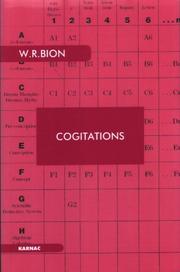
ISBN: 0429473117 1282900315 9786612900310 1849401020 9781849401029 0946439982 9780946439980 042989788X 0429912110 Year: 1992 Publisher: London : Karnac,
Abstract | Keywords | Export | Availability | Bookmark
 Loading...
Loading...Choose an application
- Reference Manager
- EndNote
- RefWorks (Direct export to RefWorks)
Cogitations, the last of the posthumous publications, is a collection of occasional writings representing Bion's attempts to clarify and evaluate both his own ideas and those of others by casting them in written form and frequently addressing them to an imaginary audience. Covering a period between February 1958 and April 1979, Cogitations delves into a wide range of material - psychoanalysis and science, mathematics and logic, literature and semantics. Some form a background to Bion's theoretical development, showing the doubts and arguments leading to the ideas expressed in his books, others highlighting and detailing some of the more abstract points in them, and some exploring topics destined for books that were to remain unwritten.
Psychoanalysis. --- Psychology --- Psychology, Pathological --- Psychoanalysis
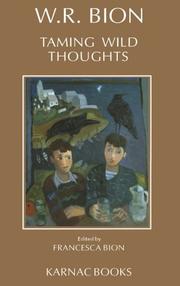
ISBN: 0429480830 1283125153 9786613125156 1849402205 9781849402200 1855751682 9781855751682 0429905602 0429919832 Year: 1997 Publisher: London Karnac Books
Abstract | Keywords | Export | Availability | Bookmark
 Loading...
Loading...Choose an application
- Reference Manager
- EndNote
- RefWorks (Direct export to RefWorks)
Taming Wild Thoughts brings together previously unpublished works from two different periods of the author's life which are linked, as the author says in her introduction, by the concept of classifying and conceptualizing thought. The first paper, "The Grid", dates from 1963 and is a discussion of great clarity about one of the author's most widely-used conceptual tools; it predates his more discursive paper of the same title (published in Two Papers) by several years. As a teaching paper on this topic, this version of "The Grid" is without parallel, and will doubtless be of great value to all students of his work. The second part of the book consists of transcripts of two tape-recordings made by Bion in 1977. They underline his interest in "wild" or "stray" thoughts; and they provide an insight into his extraordinary sensibility at the time of A Memoir of the Future.
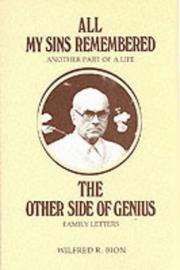
ISBN: 042991069X 0429471696 1282900919 9786612900914 1849401039 9781849401036 9781855750036 1855750031 9781855758452 Year: 1991 Publisher: London New York Karnac Books
Abstract | Keywords | Export | Availability | Bookmark
 Loading...
Loading...Choose an application
- Reference Manager
- EndNote
- RefWorks (Direct export to RefWorks)
All My Sins Remembered is the continuation of Wilfred Bion's autobiography, The Long Week-end. Although it is by no means a full account of his thirty years following the First World War - and he wrote no more - his memories of that period contrast vividly with the impression we gain of the following thirty years of his life through his letters. The Other Side of Genius gives us a glimpse of this remarkable man as his family knew him: those who met him only through his professional work will find here the same characteristic threads of humour, concern for truth, and flashes of insight that wer
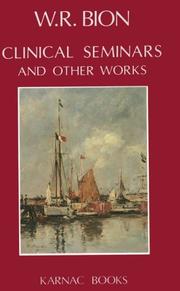
ISBN: 042991198X 0429897758 0429472986 1283118440 9786613118448 1849401578 9781849401579 1855750619 9781855750616 Year: 1994 Publisher: London Karnac Books
Abstract | Keywords | Export | Availability | Bookmark
 Loading...
Loading...Choose an application
- Reference Manager
- EndNote
- RefWorks (Direct export to RefWorks)
This selection of clinical seminars held by Wilfred Bion in Brasilia (1975) and Sao Paulo (1978) is the nearest we shall ever get to experiencing his application of his theories and views to consulting-room practice. It is also likely to be the only printed record of this area of his work. As those who underwent analysis with Bion will testify, nothing can approach the experience of the thing itself, but, failing that, these seminars may help to fill the gap now that his voice can only be heard through his published writings and lectures. Other works included are 'Four Discussions' and 'Four Papers'. The reader will find here no jargon, dogma or theoretical exposition; Bion knew that the enormous difficulties involved in communicating verbally this infinitely complex subject are only compounded by the use of what is often nothing more than "psychobabble".
Book
ISBN: 0429909535 0429484763 178241472X Year: 2018 Publisher: London : Routledge,
Abstract | Keywords | Export | Availability | Bookmark
 Loading...
Loading...Choose an application
- Reference Manager
- EndNote
- RefWorks (Direct export to RefWorks)
Bion's War Memoirs is perhaps the most exceptional piece of autobiography yet written by a psychoanalyst. The first section of the book is documentary, consisting of the entire text of the diaries which Bion wrote as a young man to record his experiences on the Western Front in 1917-1919, and this volume also includes the photographs and diagrams with which he illustrated his recollections. The diaries are followed by two later essays, in which he reflects upon his wartime experiences. Wilfred Bion has long been renowned as one of the great psychoanalysts, his career spanning much of the twent
World War, 1914-1918 --- Soldiers --- Campaigns --- Bion, Wilfred R. --- Great Britain.

ISBN: 1283125145 9786613125149 1849402191 9781849402194 9780429484766 0429484763 1855751534 9781855751538 1855751798 9781855751798 Year: 1997 Publisher: London Karnac Books
Abstract | Keywords | Export | Availability | Bookmark
 Loading...
Loading...Choose an application
- Reference Manager
- EndNote
- RefWorks (Direct export to RefWorks)
The first section consists of the entire text of the diaries which Bion wrote as a young man to record his experiences on the Western Front, including his photographs and diagrams. The second section comprises two essays in which he reflects on his war time experiences.
Bion, Wilfred R. (Wilfred Ruprecht), 1897-1979 -- Diaries. --- Great Britain. Army. Royal Tank Corps -- Biography. --- Personal narratives, British. --- Soldiers -- Great Britain -- Biography. --- World War, 1914-1918. --- World War, 1914-1918 -- Campaigns -- France. --- World War, 1914-1918 -- Personal narratives, British. --- World War, 1914-1918 --- Soldiers --- Personal narratives, British --- Campaigns --- Biography

ISBN: 042992240X 0429908172 0429483406 1283126087 9786613126085 1849404615 9781849404617 9781283126083 9781780495552 1780495552 9780429908170 9780429483400 661312608X 1855753448 9781855753440 018775344X Year: 2005 Publisher: London New York Karnac
Abstract | Keywords | Export | Availability | Bookmark
 Loading...
Loading...Choose an application
- Reference Manager
- EndNote
- RefWorks (Direct export to RefWorks)
Previously unpublished lectures from Wilfred Ruprecht Bion. The book consists of eight talks Bion gave at the Tavistock Clinic between 1976 and 1979. Topics explored include the importance of observation; dreams; art and psychoanalysis; and the significance of time in psychoanalysis. In addition, this volume includes an illuminating interview of Bion by Anthony G. Banet in 1976.'In your practice you will find yourself under pressure. You say whatever you have to say, and then there is an entirely new situation. You don't really know what is going on because it is an entirely new situation, things will not be the same. It is likely enough that the patient will say, "Why don't you say something?" Or if not the patient, the relatives - "Why don't you do something?" So you are always under pressure prematurely and precociously to produce your idea. Poor little thing! Pull it up by the roots and have a look at it - it hasn't got a chance. So you have to act as a sort of parent to the idea - protect it and give it a chance to grow in spite of these pressures; you have to be able to tolerate this state of ignorance.'- W.R. Bion
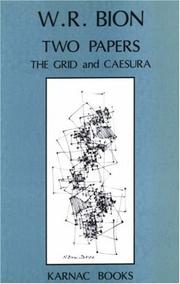
ISBN: 0429484429 1283118068 9786613118066 1849400695 9781849400695 094643977X 9780946439775 0429923422 Year: 1989 Publisher: London : Karnac,
Abstract | Keywords | Export | Availability | Bookmark
 Loading...
Loading...Choose an application
- Reference Manager
- EndNote
- RefWorks (Direct export to RefWorks)
""The Grid"" is an instrument devised by Bion to help the analyst record and elaborate observations arising from the analytic encounter. It demonstrates how mathematics can be applied to locate the development, evolution and transformation of psychic elements and events. In Caesura, Bion speculates on the relationship between physiological and psychological birth.
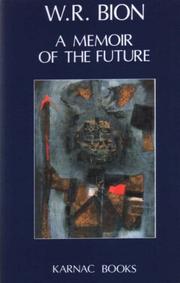
ISBN: 0429471351 128068609X 9786613663030 1849400881 9781849400886 0946439796 9780946439799 9781781811375 1781811377 0429896123 0429910355 Year: 1991 Publisher: London New York Karnac Books :Distributed in the United States of America by Brunner/Mazel, Inc.
Abstract | Keywords | Export | Availability | Bookmark
 Loading...
Loading...Choose an application
- Reference Manager
- EndNote
- RefWorks (Direct export to RefWorks)
A Memoir of the Future, Bion's unorthodox attempt to cast psychoanalytic speculation in fictional form, is composed of three semi-autobiographical novels: The Dream (1975), The Past Presented (1977), and The Dawn of Oblivion (1979) Presented here for the first time in one volume, they appear together with the Key to A Memoir of the Future, a glossary of terms and concepts compiled by Wilfred and Francesca Bion.
| Listing 1 - 10 of 24 | << page >> |
Sort by
|

 Search
Search Feedback
Feedback About UniCat
About UniCat  Help
Help News
News